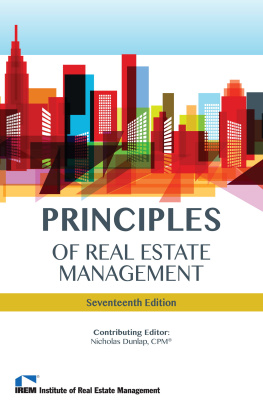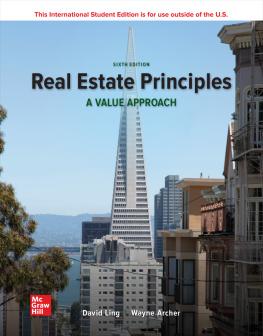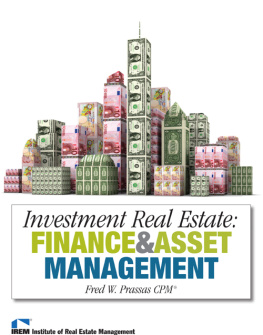Nancye J. Kirk
PRINCIPLES
OF REAL ESTATE
MANAGEMENT

Seventeenth Edition

The Institute of Real Estate Management, Chicago 60611.
2011, 2018 by the Institute of Real Estate Management of the NATIONAL ASSOCIATION OF REALTORS
All rights reserved. Sixteenth edition 2011
Seventeenth edition 2018
SKU: 971-17
ISBN: 978-1-57203-259-0
Ebook ISBN: 978-1-57203-276-7
This book or any part thereof may not be reproduced, stored in a retrieval system, or transmitted, in any form or by any means, electronic, mechanical, photocopying, recording, or otherwise, without the prior written permission of the publisher. Inquiries should be directed to Publishing Department, Institute of Real Estate Management, 430 North Michigan Avenue, Chicago, IL 60611.
This publication is designed to provide accurate and authoritative information in regard to the subject matter covered. Forms or other documents included in this book are intended as samples only. Because of changing and varying state and local laws, competent professional advice should be sought prior to the use of any document, form, exhibit, or the like.
This publication is sold with the understanding that the publisher is not engaged in rendering legal, accounting, or any other professional service. If legal advice or other expert assistance is required, the services of a competent professional should be sought.
Cover iStock/naqiewei
Text and Cover Composition:
Nadia Geagea Pupa
Managing Editor, Publications
IREM logo, IREM, C ERTIFIED P ROPERTY M ANAGER , CPM, the CPM key logo, A CCREDITED R ESIDENTIAL M ANAGER , ARM, the ARM torch logo, A CCREDITED M ANAGEMENT O RGANIZATION , AMO, the AMO circle logo, Income/Expense Analysis, Expense Analysis, JPM and MPSA are registered marks of the Institute of Real Estate Management.
IREM practices diversity. We are an inclusive organization that embraces and values differences and welcomes individuals of all races, genders, creeds, ages, sexual orientations, gender identities, and national origins and individuals with disabilities, providing an equal opportunity environment among its members, vendors, and staff.
IREM is dedicated to supporting real estate management strategies that advance an environmentally sustainable and economically prosperous future.
Library of Congress Cataloging-in-Publication Data
Names: Dunlap, Nicholas, 1982- editor. | Institute of Real Estate Management, issuing body.
Title: Principles of real estate management / developmental editor, Nicholas Dunlap, CPM.
Description: Seventeenth edition. | Chicago, IL : Institute of Real Estate Management, [2017] | Includes index.
Identifiers: LCCN 2017028590| ISBN 9781572032590 (hardcover : alk. paper) | ISBN 1572032596 (hardcover)
Subjects: LCSH: Real estate management.
Classification: LCC HD1394 .P74 2017 | DDC 333.5068dc23 LC record available at https://lccn.loc.gov/2017028590
Preface

Simply put, real estate as an industry has evolved. Gone are the days where a career in real estate just meant selling homes or brokering mortgages. Today, the industry is global and accounts for trillions of dollars of economic activity and encompasses trades like brokerage, construction, development, finance, investment, management, and valuation. With the emergence of new and specialized segments of the industry, skillsets are dynamic, specialized, and refined. Whether managing properties on Main Street or Wall Street, there are many new players and new faces in the game; however, the basics are the same. Real estate management has become its own career path, one where there are hundreds of roles, titles, responsibilities, and endless opportunities to become successful.
Although the industry has gone through some changes, many of the skills and traits of a successful real estate manager have stayed the same. The need for good people skills, analytical skills, and strong written and oral communication have only been bolstered or enhanced by technological advancements. However, this being an aging business and one where 60 percent of the workforce will be at retirement age within the next five years, the need to attract, train, and retain new talent is amplified. Old stereotypes die hard and real estate management, historically characterized as the less exciting and even lower-paying cousin of the brokerage or investment sectors, has undergone a reinvention of sorts.
During the economic downturn and the Great Recession, real estate managers were called upon en masse to play the role of receiver and help financial institutions account for, stabilize, and manage their holdings, ranging from single-family residences to strip shopping centers, office buildings, and mixed-use developments. Real estate managers helped to remove an element of stress from a highly-distressed real estate market and played a critical behind-the-scenes role in helping the economy recover. This is not the first time that real estate managers were called upon to help restore normalcy to the markets. In the late 1980s and early 1990s, the same was done for a government-owned asset management company known at the Resolution Trust Corporation (RTC).
Real estate management was mostly associated with the physical upkeep and guidance of an asset. While fiscal management was also a component, it occupied less of the real estate managers time and focus than, say, caring for curb appeal. Today, real estate managers are relationship masters and market experts, who help investors understand the marketplace and the community as it relates to their investment. The relationship between owner and operator (or investor and real estate manager) is one driven by value-add. Real estate managers are no longer just physical custodians, but financial architects who create value. The real estate manager plays an integral role in the investment process, while also helping to ensure a quality experience for customers and maximizing returns for their clients.
Just as the ownership landscape has changed, so too has the management business. Todays management professional is more sophisticated, plugged-in, and informed than ever. The Principles of Real Estate Management is in its seventeenth edition and has been revisited, revised, and remastered to include the best practices of yesterday and the best tips for today. Whether you are a seasoned professional looking for additional insight or a beginner just starting out, there is something in this textbook for you. Use it as a roadmap to your future success, or as a support tool when you need help along the way.
New and exciting information included in this seventeenth edition includes a transformed marketing chapter with an emphasis on branding and social media marketing, along with new visual diagrams and exhibits, creating a more stimulating read. There are both useful and practical suggestions that will help to inspire and empower you to make changes to your personal and professional approach. There is also additional information about the ownership landscape that is changing, what it means for your business, and how you can benefit from it.















